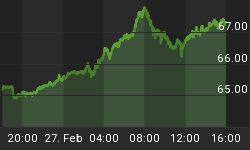The following is excerpted from a commentary originally posted at www.speculative-investor.com on 14th October 2012.
The US Presidential Election will be held on Tuesday 6th November and the election results should be known by the time the US financial markets open for trading on Wednesday 7th November. Is there anything that investors around the world should be doing in preparation for the possible outcomes of the election?
We'll attempt to answer the above question, but first here's a summary of how we see the markets and the US economy being affected by election:
1) Regardless of whether the winner is Obama or Romney, the US Federal Government will continue to run large budget deficits and rapidly increase its indebtedness. Under a Romney presidency there would probably be reduced spending in some areas, but these reductions would be offset by increased spending on the military. And the military is the most unproductive area of US government spending. Considering that the US military is already at least ten times bigger than it needs to be to fulfill its only legitimate purpose (defending the US from an attack), all resources consumed in the construction of new missiles, fighter planes, etc., are 100% wasted. Both of the two possible election outcomes are therefore negative for the US economy.
2) Regardless of who wins the election, the much-talked-about "fiscal cliff" will turn out to be a non-event. Over the next 12 months there will be no serious attempt to address the government's increasingly precarious financial position. The proverbial can will again be kicked down the road.
3) The financial markets will correctly discount the election result prior to 6th November, so while there will be a knee-jerk reaction on 7th November the reaction won't be substantial.
4) Real economic progress doesn't bring about a general rise in stock prices. Monetary inflation is the primary upward driver of the stock market, although it is true that a high rate of monetary inflation will eventually lead to a high rate of "price inflation", which, in turn, will lead to multiple-compression (reduced P/E ratios) in the stock market. Up until the time when "price inflation" is widely perceived as a big problem, the stock market should therefore perform best in parallel with the government-Fed partnership that promotes the highest rate of monetary inflation. On this basis a reasonable argument could be made that the re-election of Obama would be the more bullish outcome for the stock market. After all, Romney has said that he would replace the pro-inflation Bernanke as Fed chief.
5) If it is true that an Obama victory will lead to more monetary inflation than a Romney victory then an Obama victory is the more bullish outcome for gold and commodities and the more bearish outcome for T-Bonds and the US$.
6) It isn't necessarily true that an Obama victory will lead to more monetary inflation than a Romney victory. For starters, Bernanke is certainly not alone in his ignorance about how monetary inflation affects the economy. Almost all the other senior people at the Fed are just as ignorant, so there is no good reason to expect that Romney's appointee would be any better. This means that there will probably be a lot more "QE" over the years ahead irrespective of who comes out ahead on 6th November. For seconds, the risk of the US becoming involved in another war would arguably be higher with Romney as president, and wars invariably result in rapid inflation of the currency.
7) Further to the above, both possible election outcomes will end up being bullish for gold. However, an Obama victory would probably be the more bullish in the short term.
Returning to the question posed in our opening paragraph, our view is that there is very little difference between the two possible election outcomes with regard to the intermediate-term prospects for the US economy, US$ inflation and the financial markets. It's likely that an Obama victory would be more supportive for gold in the short term, but in any case there's a good chance that the result of the election will largely be factored into the market before election day.
If you feel the need to hedge against the increased volatility that could be caused by the election, one of the most efficient ways to do so would be to purchase VIX December-2012 $20 call options. These options will expire worthless if not much happens in the US stock market over the next two months, but they will rocket upward in price if there is a sizeable stock market decline prompted by a surprise election result or some other catalyst.
We aren't offering a free trial subscription at this time, but free samples of our work (excerpts from our regular commentaries) can be viewed at: http://www.speculative-investor.com/new/freesamples.html















